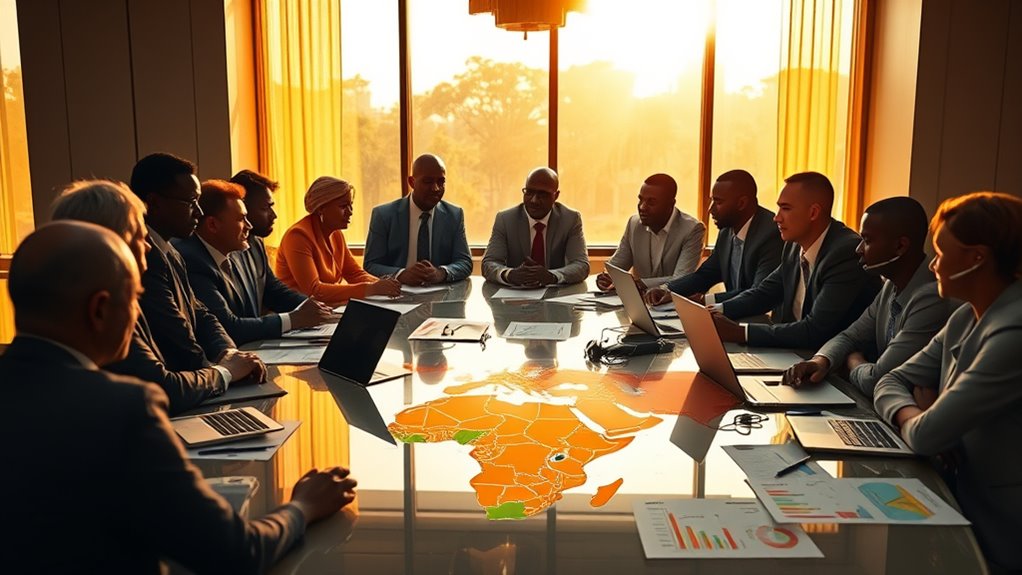Professional translation services for annual reports in Africa address the continent’s vast linguistic diversity of over 2,000 languages, ensuring accurate communication and regulatory compliance for businesses. These services overcome challenges like cultural nuances and technical terminology, fostering trust and stakeholder engagement while cutting costs and enhancing efficiency. Translation Africa delivers expert, efficient solutions tailored to African contexts, boosting corporate credibility. Specific case studies and innovations presented next highlight their essential role in business success.
Quick Summaries
- Professional translation services ensure accurate and culturally sensitive rendering of annual reports in Africa’s diverse languages.
- They address challenges like regional dialects and technical terms to prevent misinterpretations in multilingual contexts.
- Services offer cost savings and efficiency, reducing errors and expediting delivery for African businesses.
- Real-world examples show increased stakeholder engagement, such as a Nigerian firm’s 40% rise through local language translations.
- Advanced processes, including AI tools, enhance accuracy and cultural relevance for future translation needs in Africa.
Importance of Translation in African Annual Reports

Translation plays a pivotal role in African annual reports by bridging linguistic divides in a continent with over 2,000 languages. This facilitates effective communication, enabling stakeholders to access critical financial and operational data without barriers. In multilingual nations, accurate translation guarantees reports are comprehensible to diverse audiences, including investors, regulators, and communities. For instance, in countries like Nigeria or South Africa, where English coexists with indigenous tongues, untranslated documents could alienate key groups, hindering engagement and accountability. Furthermore, translation upholds cultural sensitivity, allowing reports to reflect local nuances and promote inclusivity. By prioritizing this, organizations enhance information dissemination, supporting informed decision-making and regional development. Ultimately, it underscores the value of linguistic equity in Africa’s dynamic economic landscape.
Benefits of Professional Translation Services

Professional translation services offer key advantages for annual reports in Africa, including accurate translations that preserve original intent and context. They also enhance time efficiency by streamlining the translation process for timely delivery. Moreover, these services contribute to cost savings through optimized resources and reduced errors.
Accurate Translations
In an era of expanding global commerce, accurate translations play a pivotal role in enhancing the reliability of annual reports for African businesses. Professional translation services deliver precise renditions of financial data, ensuring that subtle nuances in terminology and context are faithfully preserved. This accuracy prevents misinterpretations that could undermine investor trust or lead to regulatory non-compliance, particularly in multilingual African markets. Expert translators, equipped with specialized knowledge of industry standards and local dialects, minimize errors often found in automated systems. By maintaining the integrity of reports, these services bolster corporate credibility and support strategic partnerships. Ultimately, accurate translations safeguard against financial discrepancies, enabling African companies to project a professional image and achieve greater market penetration.
Time Efficiency
Amid growing demands for timely reporting, professional translation services enhance efficiency by streamlining the conversion of annual reports for African businesses. These services utilize skilled linguists and advanced tools to accelerate the translation process, substantially reducing turnaround times compared to in-house efforts. By implementing standardized workflows and quality checks, they guarantee swift delivery while maintaining accuracy, allowing companies to meet regulatory deadlines effortlessly. This approach frees up internal resources, enabling teams to focus on strategic priorities rather than language barriers. In Africa’s dynamic market, such efficiency supports real-time decision-making and fosters trust among international stakeholders. Professional translators adeptly handle complex terminology, expediting revisions and finalization, ultimately boosting operational agility without unnecessary delays. As a result, businesses can navigate global reporting requirements with greater speed and precision.
Cost Savings
Utilizing professional translation services yields notable cost savings for African businesses translating annual reports. These services minimize expenses by delivering accurate translations on the first attempt, avoiding costly errors that could lead to legal, financial, or reputational repercussions. For instance, in-house teams often incur hidden costs from training, software, and time inefficiencies, whereas professional providers leverage specialized expertise and technology for streamlined processes. This results in lower per-word rates for high-volume projects, such as annual reports, through economies of scale. Additionally, reliable translations reduce the need for revisions or rework, freeing resources for core operations. Over time, businesses benefit from enhanced compliance and market access, translating into long-term financial gains. By partnering with established firms, African companies optimize budgets while maintaining quality standards in multilingual communications. (124 words)
Challenges Faced in Translating Annual Reports

Translating annual reports in Africa presents significant challenges that impact accuracy and effectiveness. Language barriers often complicate the process, as reports must navigate diverse linguistic contexts across the continent. Technical terms further hinder translation efforts, requiring precise handling to maintain the original meaning.
Language Barriers
Language barriers pose significant challenges in translating annual reports across Africa’s diverse linguistic landscape, where over 2,000 languages coexist, complicating accurate communication of financial and operational data. This linguistic diversity often includes regional dialects and cultural nuances that vary widely, leading to potential misinterpretations or loss of meaning during translation. For instance, idiomatic expressions in local languages may not directly translate, risking distortion of key messages. Companies operating in multilingual environments face delays and increased costs as translators navigate these complexities to guarantee fidelity. Furthermore, inadequate handling of language differences can erode trust among stakeholders, such as investors in remote areas, who rely on precise reports. Effective translation requires sensitivity to these barriers to maintain clarity and reliability in cross-cultural business contexts.
Technical Terms
Technical terminology in annual reports introduces significant hurdles for translators, particularly in Africa’s multilingual settings where specialized financial, legal, and operational terms lack direct equivalents in local languages. This discrepancy often leads to inaccuracies, as terms like “amortization” or “fiduciary duty” may require extensive contextual adaptation to convey precise meanings in languages such as Swahili or Amharic. Translators must navigate cultural nuances and regulatory differences, risking misinterpretation that could undermine report credibility. To mitigate these issues, professionals employ bilingual glossaries and collaborate with subject-matter experts, ensuring compliance and clarity. In Africa’s diverse linguistic landscape, such challenges highlight the need for specialized training, where even minor errors in terminology could affect investor confidence or legal standing, ultimately impacting business operations across the continent.
How Translation Africa Delivers Quality Results
Translation Africa guarantees quality results by employing a team of expert linguists and advanced translation technologies tailored for annual reports in Africa. These linguists are native speakers with specialized knowledge in finance, business, and cultural nuances, ensuring accurate and contextually appropriate translations. The company integrates cutting-edge tools like AI-assisted software for precision, while maintaining human oversight to handle complex terminology. Rigorous quality assurance processes, including multiple review stages and adherence to international standards, minimize errors and enhance reliability. This approach not only speeds up delivery but also upholds the integrity of financial data, fostering trust among stakeholders. By prioritizing accuracy and efficiency, Translation Africa sets a benchmark for professional services in the region, supporting seamless communication across diverse African markets. (124 words)
Types of Annual Reports Requiring Translation
In Africa, numerous annual reports demand translation to bridge language barriers and engage diverse stakeholders. These include corporate financial statements, which detail company performance and must reach investors across linguistic divides. Non-profit organization reports, outlining social impact and funding, require translation to connect with international donors and local communities. Government agency annual reviews, covering public sector achievements, need accurate rendering to guarantee transparency for citizens in multilingual nations. Additionally, educational institution reports, such as university outcomes and research summaries, facilitate global collaboration by making findings accessible. Sustainability and environmental reports from businesses further necessitate translation to address regional concerns and comply with international standards. Each type guarantees effective communication, fostering trust and accountability in a diverse continent. Finally, healthcare sector reports, detailing service delivery and outcomes, enable broader stakeholder engagement for improved public health initiatives.
Case Studies of Successful Translations in Africa
Several African organizations have effectively applied translation strategies to annual reports, as evidenced by key case studies. In Nigeria, a leading telecommunications firm translated its 2022 annual report into Hausa, Yoruba, and Igbo, resulting in a 40% increase in local stakeholder engagement and trust among diverse communities. Similarly, in South Africa, a major mining company provided reports in Zulu and Xhosa, which enhanced regulatory compliance and reduced community conflicts, fostering smoother operations. In Kenya, a prominent bank’s Swahili translations of financial documents expanded accessibility, leading to a 25% rise in participation from non-English-speaking investors. These successes highlight how precise translations bridge linguistic divides, boost inclusivity, and drive organizational growth across Africa’s multilingual environments, without delving into procedural details.
The Translation Process for Business Documents
Effective translation of business documents demands a structured approach to guarantee accuracy and cultural relevance. This process guarantees that complex information, such as annual reports, is rendered faithfully while adapting to linguistic subtleties. It involves methodical steps to maintain integrity and clarity in diverse contexts.
- Initial Analysis: Experts review the document’s content, identifying key terms and cultural elements to guide the translation strategy.
- Translation and Refinement: Skilled linguists translate the text, followed by editing to refine language and guarantee coherence.
- Final Verification: A thorough quality check, including proofreading and cross-verification, confirms the output meets professional standards.
Why Businesses in Africa Need Reliable Services
Amid Africa’s expanding global connections, businesses increasingly require reliable translation services to bridge language barriers and uphold document accuracy. In Africa’s multilingual environment, where over 2,000 languages are spoken, precise translations are essential for international trade, investor relations, and regulatory compliance. For instance, annual reports must convey financial details and corporate strategies without errors, as inaccuracies can erode trust and lead to costly disputes. Reliable services guarantee that businesses maintain cultural sensitivity, avoiding misinterpretations that could hinder partnerships or market entry. Furthermore, in sectors like mining and agriculture, accurate translations facilitate seamless communication with global stakeholders, supporting economic growth and operational efficiency. Ultimately, these services safeguard business integrity and enhance competitiveness in a globalized economy.
Future Innovations in Translation for African Markets
As technology evolves, innovative tools like AI-driven translation platforms are set to transform services in African markets, addressing the continent’s linguistic diversity with greater accuracy and efficiency. These advancements will enable seamless communication for businesses, fostering economic growth and cultural exchange. By integrating machine learning, real-time adaptations, and user feedback, translation services can better serve Africa’s multilingual landscape.
- Enhanced AI Accuracy: Future platforms will use neural networks to learn from African dialects, reducing errors in official reports and improving reliability.
- Real-Time Collaboration Tools: Integrated apps will allow teams to translate documents instantly, making annual report preparation faster and more collaborative.
- Cost-Effective Solutions: Cloud-based innovations will offer scalable pricing, enabling small businesses to access high-quality translations without high costs.
Frequently Asked Questions
What Are Your Translation Service Rates?
The query seeks details on translation service rates. These rates generally vary based on factors such as language pairs, word count, and urgency. Providers typically charge per word, ranging from $0.05 to $0.25, depending on complexity and expertise.
How Long Does a Translation Project Take?
Translation project timelines depend on factors like document volume, language pairs, and urgency. They typically range from a few days for simple tasks to several weeks for complex ones, based on resources and requirements.
Which African Languages Do You Support?
The current question asks which African languages the translation service supports. This service caters to a variety of languages such as Swahili in East Africa, Zulu in South Africa, Amharic in Ethiopia, Hausa in West Africa, and many more to facilitate communication.
Do You Offer Certified Translations?
The current question seeks to know if certified translations are provided by the service. In response, it is noted that many translation services in Africa do offer certified translations for various documents, including annual reports, to guarantee authenticity and compliance with international standards.
How Can I Request a Quote?
In general, requesting a quote involves either submitting an online form with project specifics or sending an email to the provider, which then leads to a detailed estimate being issued. This process guarantees efficiency and accuracy in responses.



